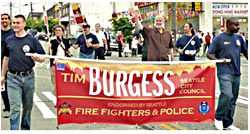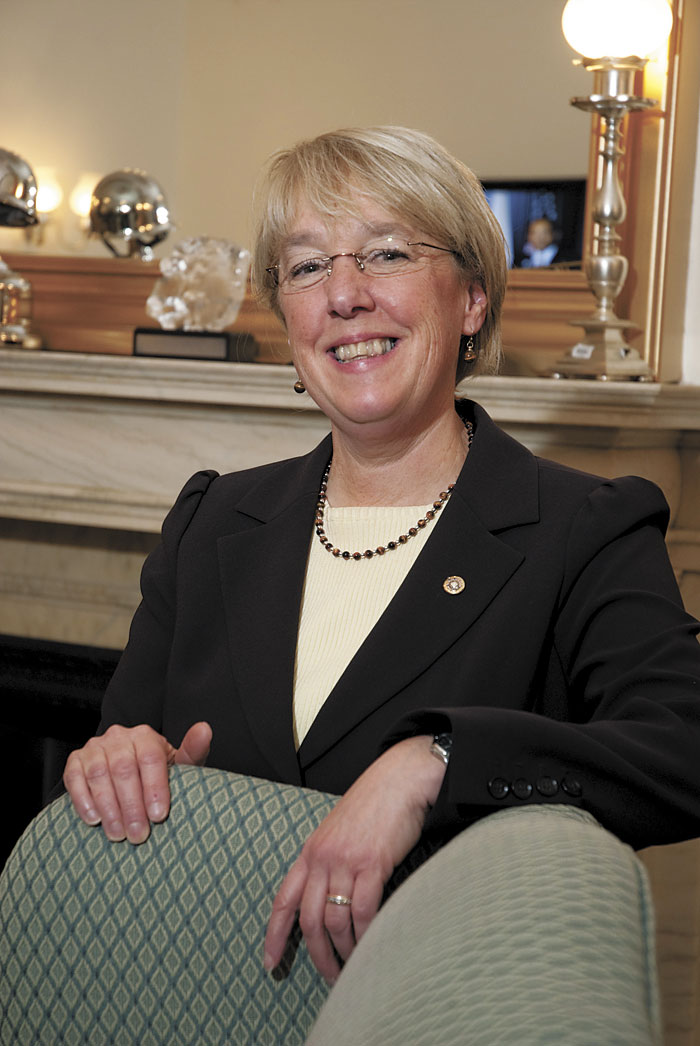Show up at Seattle Fire Fighters Union headquarters on lower Queen Anne, and there’s no mistaking who its horse is in this fall’s City Council elections. If you happen to miss the giant red and yellow Tim Burgess sign in the window, you’re bound to get the message with the Burgess propaganda splayed conspicuously across the receptionist’s desk.
But the firefighters union (Local 27) isn’t just endorsing Burgess in his bid to unseat David Della—it is mounting an all-out effort to oust the one-term incumbent. And if it succeeds, this year’s very visible campaign may catapult the union into big-time player status in the local political arena.
Since endorsing Burgess in June, the firefighters have been marching with the candidate in parades, accompanying him to senior centers, introducing him at debates, handing out flyers, and manning his phones.
“We want to support [Burgess] in all ways,” says Local 27 Vice President Ken Stuart.
Traditionally, firefighters have chimed in with endorsements or built yard signs for local campaigns. But in 2005, they financed a TV spot in support of Dwight Pelz, who was unsuccessful in his bid to unseat City Council member Richard McIver. Their efforts on Burgess’ behalf, however, are arguably the most active they’ve ever been in a single race.
“We’ve done all these things before, but not for one person,” Stuart says. “We’ve also never gone out this early, been this active, or done opposition research.”
Part of the interest this year, he says, is that firefighters have been increasing their political involvement at both the state and national level. “We’re maturing as an organization,” Stuart says. “We want to continue that trajectory. We’ve seen the need lately to increase our efforts and put an emphasis in political activity at the city level.”
The other thing, according to Stuart and union President Ryan Ellis, is that Della’s been a disappointment. His biggest fumble, in their eyes, came last fall during a failed effort to thwart an unpopular proposal in the mayor’s budget that sought to change the uniform disability officer from a captain in the Fire Department to a civilian position—a cost-cutting maneuver that meant the person in charge of communications between the firefighters and the city’s workers compensation unit would no longer be a firefighter.
This plan rankled the union, which argued that a nonfireman wasn’t qualified to decide whether firefighters are ready to return to work. So they lobbied the council to block the change, tapping Della and council member Jan Drago to spearhead the effort. In turn, Della and Drago submitted an amendment along the union’s desired lines, but it was never included in the final budget.
Stuart says Drago was as shocked as he was that the amendment hadn’t stuck. “It was clear that Della didn’t follow through,” he says. “We don’t ask for much most of the time. We felt we weren’t important enough.”
Della’s political consultant, Michael Grossman, says his client was clearly interested in the firefighters’ cause, otherwise he wouldn’t have co-sponsored the amendment in the first place. “Ultimately, it’s up to the chairman of the budget committee what does or doesn’t get in,” Grossman says.
That chairman, Richard McIver, says he’s surprised the firefighters are trying to pin the failed amendment on Della. He says it was left out simply due to timing. “I said, ‘Let’s leave the [uniform disability officer] on the table for the contract negotiations rather than just put it through,'” McIver recalls.
But Stuart insists the blame lies squarely with Della. “It was a failure that’s surpassed anything I’ve dealt with and a clear indication of why we’re not enamored with David,” he explains. (Though the uniform position wasn’t funded, it still exists. The Fire Department ultimately moved money around to come up with the additional $38,000 needed to keep the disability officer position uniformed.)
“It was the cherry on top,” says Ellis, adding that Della has also helped thwart a Fire Department–backed plan to expand Queen Anne’s Fire Station 20 (see Rick Anderson’s “Burning Down the House,” Aug. 9, 2006).
Firefighters say they like Della’s opponent, Burgess, because as a former police officer, he’s one of their own. “He understands what it’s like to work the streets and not just rely on memos from the Police Department,” Stuart says.
Burgess has also received the endorsement of the Seattle Police Officers Guild. Meanwhile, Della has strong support from the labor unions. “If we’re going to have a debate about what effect a single union is going to have in that race,” says Grossman, “it’s worth noting that my guy has got just about every one of them.”
Political consultant Cathy Allen says the fact that the firefighters are targeting Della shows that they’re serious about raising their profile. “If you were looking to make a statement this year, it would be, ‘Who of the two campaigning for the open seat could I put over the top?'” she explains. “But to take on an incumbent—one supported by labor, a person of color, and someone who has roots in the activist community—is a gutsy move. It certainly looks like they’re trying to distinguish themselves and create their own political base.”
“Should Tim win, obviously their stock as political heavyweights will improve,” adds Christian Sinderman, a consultant for Burgess.
The firefighters union also has a lot of cash: Its political action committee has more than $117,000 in the bank. While PACs are still beholden to the $700 limit for contributions to candidates, they are unrestricted as to how much they can spend on things like TV and radio ads.
But McIver looks upon the ramped-up efforts of firefighters and police with a wary eye, explaining that he gets concerned when public safety officers start playing politics.
“When they play, they have to play the whole game and [realize] that’s not going to make friends with the budget chair,” he says, referring to his leadership position and the flap about the budget amendment (though he maintains leaving their request out was in no way retribution for the ad the firefighters funded for his opponent in 2005).
McIver also questions how formidable a force the firefighters actually are. “They took out an investment in my campaign two years ago,” he says. “Let’s just say Mr. Pelz didn’t get my seat.”
But the firefighters think this year will be different. Asked if they hope to parlay a Burgess win into future king-making endeavors, Stuart says simply, “Yes—anything’s feasible,” before quipping, “We also have plans to rule the world.”






